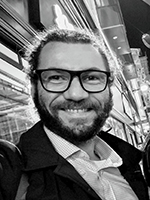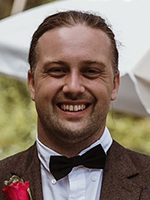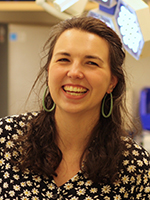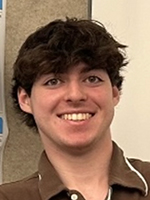People
Current Members of the Lab
James Bourne, Ph.D.| Principal Investigator

Before joining NIMH to start the Section on Cellular and Cognitive Neurodevelopment, Dr. Bourne resided in Melbourne, Australia, at Monash University and was most recently a Group Leader at the Australian Regenerative Medicine Institute. Before moving to Australia, he completed his undergraduate training in Biochemistry (Hons) at Imperial College of Science, Technology, and Medicine, London. Following this, he pursued a Ph.D. in Neuropharmacology, undertaking a joint project with the Ministry of Defence (UK) and King’s College, London. In 2003, he was awarded an Australian Research Council (ARC) Postdoctoral Fellowship and started developing an independent research area in primate cortical development and maturation. While moving throughout different departments at Monash University, in 2009, he accepted a position at the newly founded Australian Regenerative Medicine Institute at Monash University, where he led a group of 13, including Postdoctoral fellows and students. In 2014 he received a prestigious NHMRC Senior Research Fellowship and the NHMRC Marshall and Warren Award in 2018 for the most Innovative Project Grant (1/ 3110).
Kevin Marche, Ph.D. | Staff Scientist

Kevin earned his Ph.D. in neuroscience from the Department of Pharmacology at the University of Lille, where he studied the behavioral characteristics of rodent models related to psychopathology, including fetal alcohol spectrum disorder, schizophrenia, and depression. Following his Ph.D., Kevin embarked on his first postdoctoral journey at the CNRS in Marseille under the mentorship of Dr. Paul Apicella. He focused on decision-making under uncertainty, using electrophysiological recordings in the basal ganglia to study information processing. For his second postdoctoral experience, Kevin joined the University of Oxford, working with Professor Matthew Rushworth. In Oxford, he investigated the information processing of adaptive behavior through functional imaging. He brings his expertise to research projects exploring the neurodevelopmental aspects of thalamocortical connectivity in marmosets, particularly emphasizing the thalamus-prefrontal cortex connection.
Qun Gao, Ph. D. | Laboratory Manager, Contractor

Qun has wide-ranging experience in biological research and laboratory management. Before joining SCCN, she assisted in and coordinated various laboratory activities and oversaw the maintenance of core instruments. Currently, she manages daily laboratory operations, such as procurement, equipment maintenance, lab services, and safety and animal documentation. She also handles any arising tasks needed to help research projects move forward efficiently.
Xianfeng (Lisa) Zhang | Animal Manager, Contractor
Lisa joined SCCN in May 2022 after working for NINDS since 2005. She has vast experience in animal care and husbandry, as well as mammalian biology. Before joining SCCN, Lisa worked on MRI scan studies and transgenic marmoset projects at NINDS.
Jack Scott, Ph.D. | Postdoctoral IRTA Fellow

Jack is deeply engaged in advancing our understanding of the brain's complex network dynamics. His research is primarily focused on unraveling the distributed networks between the thalamus and cortex, which play a critical role in the development of cognition and complex behaviors. By examining these networks, Jack aims to shed light on the neural mechanisms underlying psychiatric disorders, contributing to the development of more effective treatments. Jack employs a multidisciplinary approach in his research, utilizing cutting-edge systems-based techniques. His expertise spans neuroimaging, electrophysiology, neurosurgery, and behavioral analysis, allowing him to investigate brain function at multiple levels of resolution. Through his work, Jack seeks to bridge the gap between fundamental neuroscience and clinical application, aiming to improve mental health outcomes.
Andrea Romanowski, Ph.D. | Postdoctoral IRTA Fellow

Andrea received her Ph.D. in Molecular Medicine from the University of Maryland School of Medicine in the lab of Alexandros Poulopoulos. She joined SCCN as a postdoctoral fellow to investigate thalamocortical circuit formation during brain development, particularly in the context of psychiatric disorders. She is interested in using gene editing techniques like CRISPR/Cas9 to perform gene knockouts and knockins to understand the function of specific risk-genes in the developing brain. Ultimately, her goal is to investigate how genetics inform brain circuit wiring, and how mutations in neuropsychiatric risk-genes can alter the way circuits form.
Angela Fan, BMedSc (Hons) | Predoctoral IRTA Fellow

Angela is currently a Ph.D. student from Monash University and part of the SCCN as a pre-doctoral visiting fellow. Her research interests surround the development of thalamocortical circuits and how dysfunction in these circuits reflects what is observed in psychiatric disorders. She is using viral tracing techniques to dissect the precise cellular circuits that drive cognition and behavior, and her goal is to manipulate and visualize these circuits using chemogenetics and calcium imaging.
Noah Kuehn, B.S. | Predoctoral IRTA Fellow

Noah Kuehn is a Ph.D. student studying Pharmacology and Physiology in the Georgetown University-NIH Graduate Partnership Program. He earned his Bachelor of Science in Bioengineering with an emphasis in Biomolecular Engineering from Santa Clara University in 2023. Noah is interested in cellular- and circuit-level changes associated with psychiatric disorders. He hopes research on brain development will provide insights to create more effective therapeutic strategies. Noah's prior research experience includes studying the mechanism of small molecule inhibitors, validating a drug discovery platform using molecular photonics, and engineering scavenger exosomes. Noah enjoys being in nature, running, and baking in his free time.
Jess Phan, BMedSc (Hons) | Predoctoral IRTA Fellow

Jessica earned her undergraduate degree in Molecular Biology from Pomona College, where her research focused on exploring non-pharmacological approaches to treating attention-deficit/hyperactivity disorder (ADHD). Following graduation, she was awarded a Fulbright Research Scholarship to study addiction and public policy at the i3S Research Institute in Portugal. She also researched primary immunodeficiencies at the National Institute of Allergy and Infectious Diseases (NIAID). Her participation in the NIH Academy on Health Disparities deepened her commitment to advancing health equity in healthcare access in outcomes. In the Harvard/MIT MD-PhD program, Jessica investigated the neuroimmunological underpinnings of neuropsychiatric diseases. Currently, through the NIH OxCam program, Jessica collaborates with Prof. Angela Roberts’s lab at the University of Cambridge to study the marmoset prefrontal cortex, with a specific focus on its role in approach-avoidance decision-making.
Josephine Kleve B.S. | Post-baccalaureate IRTA Fellow

Josephine (Josie) graduated from Michigan State University in May 2023 with B.S. degrees in Genomics & Molecular Genetics and Cellular and Developmental Neuroscience, as well as a minor in Bioethics. At MSU, she worked with Dr. Brian Schutte to study genetic risk factors for orofacial clefting, particularly the role of periderm epithelial tissue and its associated genes in signaling changes in palate development. Josie joined SCCN in June 2023, and her research interests include studying schizophrenia from a neurodevelopmental perspective by investigating protein localization and gene expression patterns throughout the brain during development. After her time at the NIH, she plans to pursue an MD-PhD degree studying neuroscience.
Jordan Jontz B.S. | Post-baccalaureate IRTA Fellow

Jordan graduated from Washington and Lee University in May 2024 with a B.S. degree in Neuroscience with minors in Creative Writing and French. At W&L, Jordan conducted research under the guidance of Dr. Paul Cabe studying species conservation genetics, particularly investigating potential unidentified keystone crayfish species in Virginia. She joined SCCN in June 2024, and she is interested in studying the genes involved in the neurodevelopment of schizophrenia and developing gene therapy tools to investigate them. After her time as a post-baccalaureate fellow, Jordan plans to pursue a Ph.D. in Neuroscience.
Max Walker (Honours Student)

Max is an undergraduate student at the University of Maryland, College Park where he is double majoring in Neuroscience and Biochemistry. He joined SCCN in June 2023 with a research focus in studying schizophrenia by exploring protein localization in the brain to determine the developmental timeline for their production. After completing his undergraduate degree, Max plans to pursue a Ph.D. in the realm of neuroscience.

